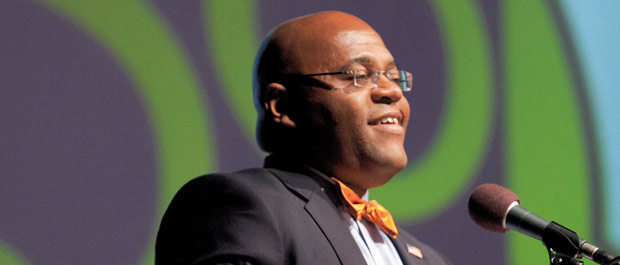During a rousing keynote speech at April’s Reunions Weekend, U.S. Senator William “Mo” Cowan ’91 deftly combined the personal and political as part of the university’s “Celebrating the Past, Charting the Future: Commemorating 50 Years of Black Students at Duke.” His talk in Page Auditorium touched on the legacy of African-American students at Duke, his own campus experiences, and the imperative of providing high-quality education for minority students.
“Duke had the same transformative power on me as it did to so many other students, both before and after my time here,” said Cowan, the first African American to represent Massachusetts in the U.S. Senate since 1978. “And our success is beholden to the First Five, and all those who came before us who methodically tore down barriers of inequality. Over the decades, members of this community stood forward to demand that this campus be more representative of its own ideals.”
Cowan was referring to the first five black undergraduates who enrolled at Duke in the fall of 1963: Wilhelmina Reuben-Cooke, Nathaniel White Jr., Gene Kendall, Cassandra Smith Rush, and Mary Mitchell Harris. The three surviving members of that cohort—Reuben-Cooke, White, and Kendall—were all in attendance at the event, along with the extended families of Rush and Harris, who died in 1996 and 2002, respectively. Also attending and recognized during the program were a number of the first black students to integrate the graduate and professional schools.
Connecting the past and the present, Cowan noted that he was standing on the same stage where, in 1964, the Reverend Martin Luther King Jr. called for equality under the law. “Now I am asking for your help to level the playing field for our kids today and their kids for generations to come,” he said. “In this very hall, Dr. King reminded us that ‘human progress never rolls through on the wheels of inevitability. It comes through on the tireless efforts and consistent work of dedicated individuals. ... It is necessary to recognize that the time is always right to do right.’ ” President Richard H. Brodhead, who introduced Cowan, said that while it took Duke University to resolve to open its doors to all, it took actual young men and women to walk through those doors. He continued, “They had to represent the whole promise of your race. When Duke integrated, it did not add five black students. It transformed itself.”
The university’s 50th commemoration continues through October with a wide range of campus and regional events. A closing celebration takes place during Founders’ Day weekend in October. Visit spotlight.duke.edu/50years for details.

Share your comments
Have an account?
Sign in to commentNo Account?
Email the editor